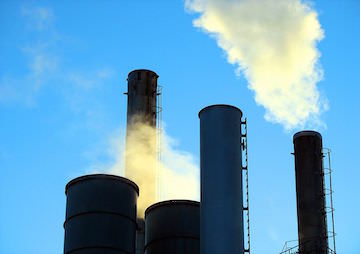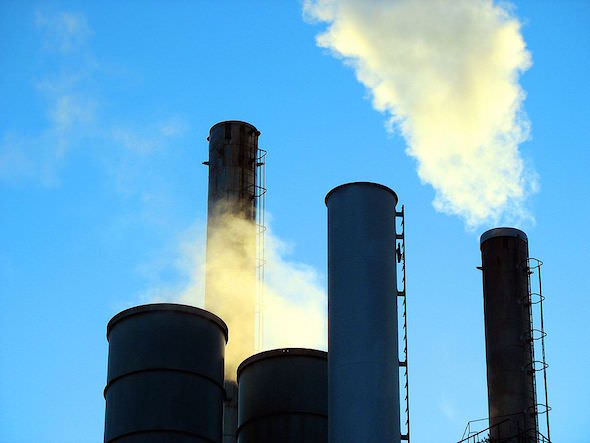Long-Lived Carbon Dioxide Warms World for Many Millennia
Research shows that carbon dioxide emitted by the burning of fossil fuels traps heat in the atmosphere for thousands of years.
By Tim Radford, Climate News Network

Heat emitted by the burning of fossil fuels has far less impact on the atmosphere than the carbon dioxide does. (Uwe Hermann / Wikimedia Commons)
This piece originated with Climate News Network.
LONDON — Gun the engine, and the ignition of fossil fuel produces not just working energy but heat that dissipates quickly into the atmosphere. But it also produces carbon dioxide that dissipates into the atmosphere.
And in less than two months, according to new research, that pulse of carbon dioxide will have engendered more heat for the planet than the original touch of the accelerator. Xiaochun Zhang and Ken Caldeira of the Carnegie Institution at Stanford, California, in the United States report in Geophysical Research Letters that the carbon dioxide warming exceeds the heat released by a single act of oil combustion in just 45 days.
Light the gas in the cooking stove and the heating cost to the planet is exceeded in 59 days. Burn a lump of coal, and the atmosphere feels the greater heat in just 34 days. And in all three cases, the pulses of carbon dioxide will go on heating the planet — and on, and on.
“Ultimately, the warming induced by carbon dioxide over the many thousands of years it remains in the atmosphere would exceed warming from combustion by a factor of 100,000 or more,” said Professor Caldeira.
No escape
Caldeira and another colleague only recently calculated that the average interval between the combustion of fossil fuel and the consequent global warming was about 10 years. The latest research involves no contradiction.
“It takes a decade before we feel the maximum amount of warming caused by a CO2 emission (and it stays warm for many centuries, if not millennia). Energy is added to the atmosphere from the heat given off when a lump of coal is burned. Meanwhile, the CO2 given off in that burning prevents energy from escaping the atmosphere and going into outer space.
“This also results in more energy in the atmosphere. It only takes a month-or-so time scale before the greenhouse effect caused by CO2 emitted upon combustion prevents an amount of energy from escaping to space equivalent to the amount of energy released upon combustion.
“After about a month, the two effects have done about the same to warm the Earth, but as time goes on the CO2 greenhouse effect continues affecting the climate system,” he told Climate News Network.
Swift reaction
Ultimately, such research is a graphic illustration of humanity’s unwitting experiment, since the start of civilisation, with the climate in which civilisation first evolved. It is also one in which the penalty exacted follows unexpectedly swiftly upon the act committed. The two scientists considered the consequences not just of any single act of combustion, but of the impact of continuous burning of coal, oil and natural gas for the CO2 levels in the atmosphere, and the consequent warming.
Under steady, continuous combustion, the warming caused by the consequent carbon dioxide exceeds the heat released by coal in 95 days, by oil in 124 days, and by gas in 161 days. “If a power plant is burning continuously, within three to five months, depending on the type of power plant, the CO2 from the power plant is doing more to heat the Earth than the fires in its boiler,” Professor Caldeira said.
“As time goes by, the rate of burning in the power plant stays the same, but the CO2 accumulates, so by the end of the year, the greenhouse gases will be heating the Earth much more than direct emissions from the power plant.”
Your support matters…Independent journalism is under threat and overshadowed by heavily funded mainstream media.
You can help level the playing field. Become a member.
Your tax-deductible contribution keeps us digging beneath the headlines to give you thought-provoking, investigative reporting and analysis that unearths what's really happening- without compromise.
Give today to support our courageous, independent journalists.









You need to be a supporter to comment.
There are currently no responses to this article.
Be the first to respond.